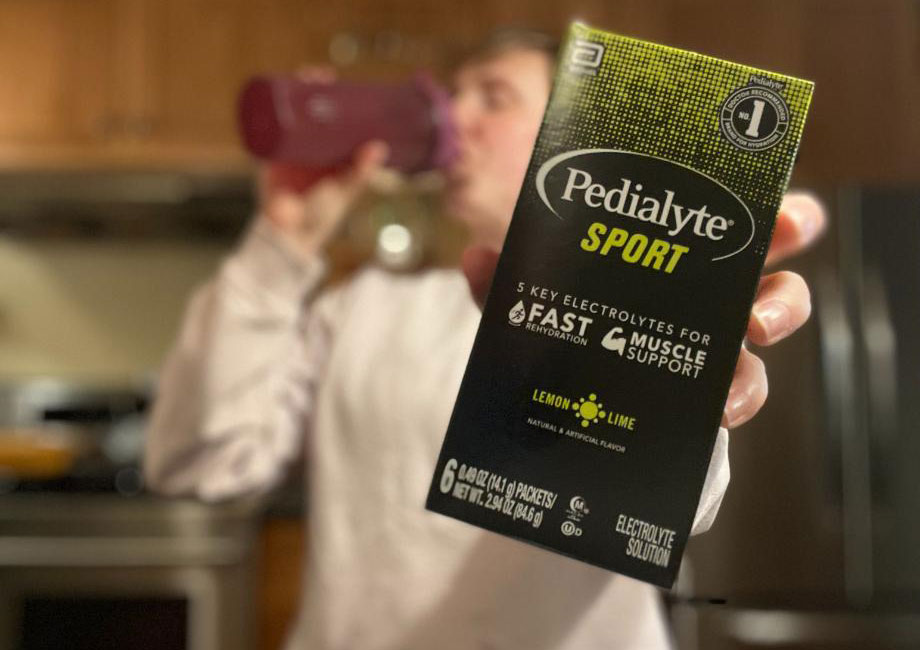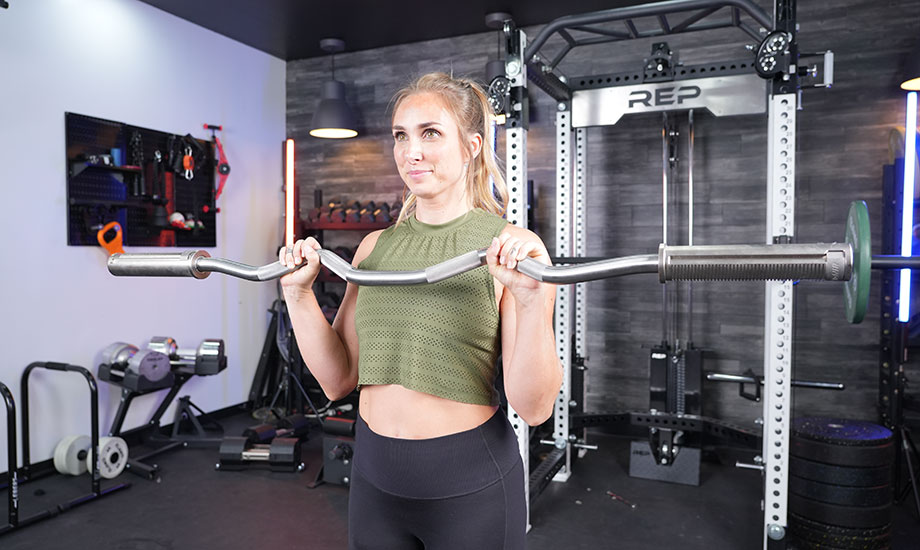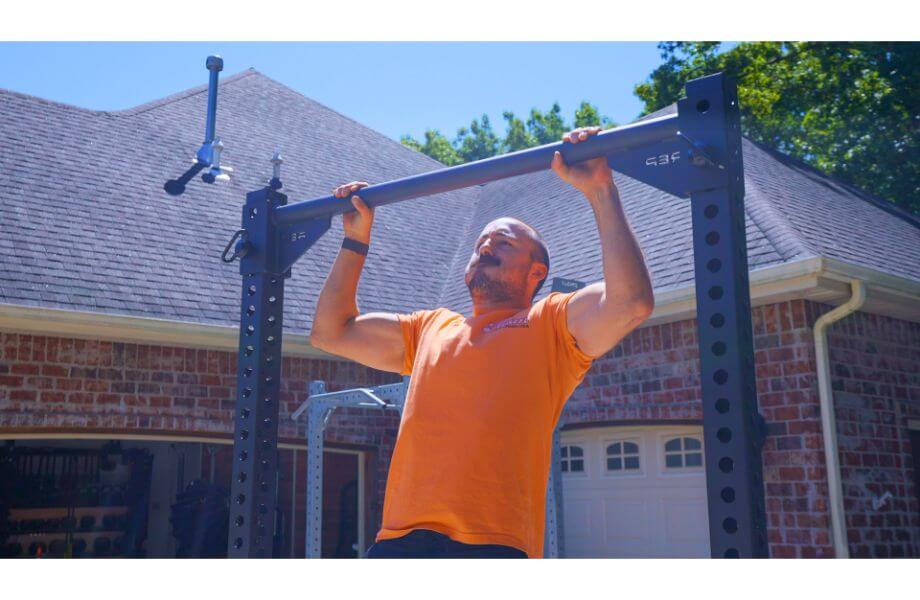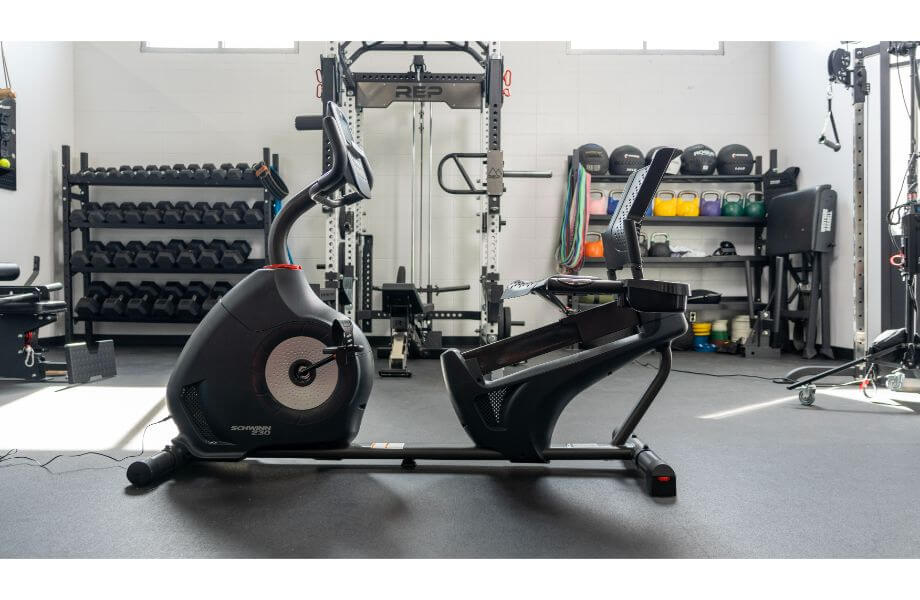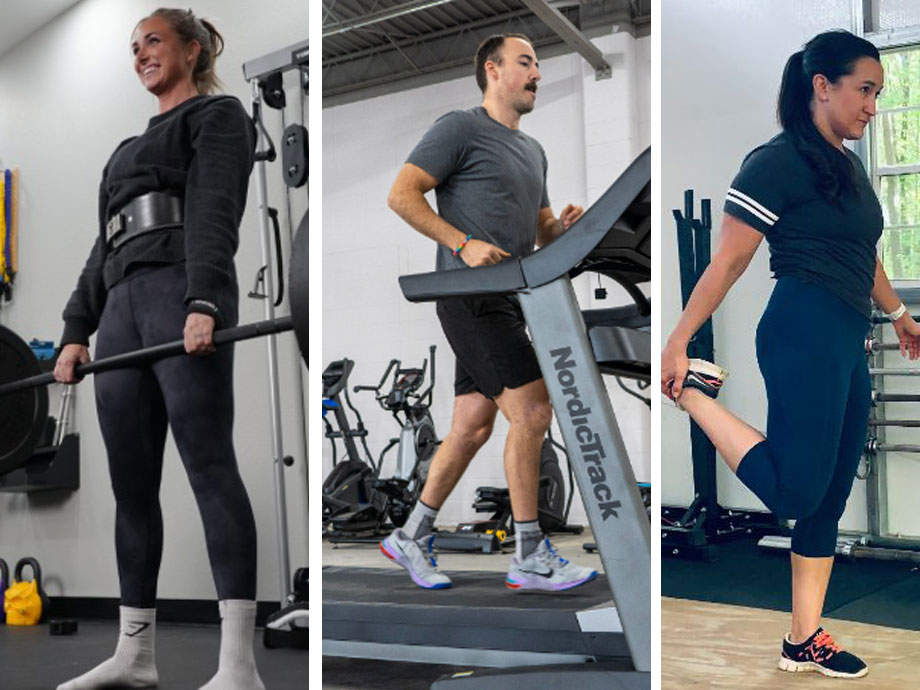Pedialyte is among the best electrolyte drinks for hydration and helps rehydrate children after fluid loss, usually due to excessive vomiting, diarrhea, or sweating. However, recently, sweaty adults had the thought, if it works so well for babies, why not us?
For this Pedialyte Sport drink review, we had the electrolyte solution tested by Lauren Strong, CPT, GGR senior staff writer, and certified adult. We had Lauren use the powder form of Pedialyte as a rehydration tool after her workouts and report back her findings.
Read on to find out what she thought of this hydration tool.
From Electrolytes to Protein Powder, We’re the Supplement Experts
The fitness professionals, registered dietitians, and personal trainers on GGR’s team test each nutritional product personally to provide you with a raw and honest picture of the supplements we review.
We rate products using a 1 to 5 scale based on our custom GGR supplement testing methodology. This methodology examines criteria like:
- Quality of the formulation
- Taste/solubility
- Side effects
- Third-party testing
- Price/value
- Customer reviews/service
Pedialyte Sport Powder Packs
Pedialyte Sport Powder Packs
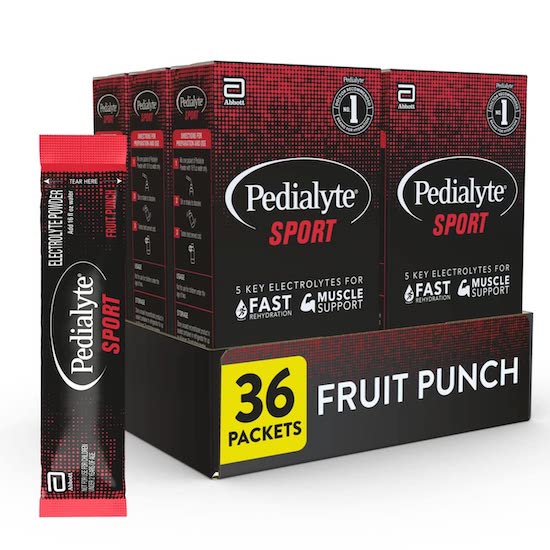
Product Highlights
- Contains 5 important electrolytes
- Great for on the go
- Scientifically balanced sugar and electrolytes
- Lemon lime and fruit punch flavors
Pros & Cons
Pros
- 5 types of electrolytes
- Scientifically designed
- Great for on the go
- Additional electrolytes to support muscle
Cons
- Contains artificial ingredients
- Heavy salt flavor
- Only two flavor options
Bottom Line
Pedialyte Sport Powder Mix is a travel-friendly upgrade to a classic electrolyte solution.
A Quick Look at Pedialyte Sport
Pedialyte is a product of Abbott Nutrition, a company that hospital dietitians are very familiar with because they’re also one of few companies that makes tube-feeding formulas for the critically ill.
Abbott also distributes baby formula, so it makes sense that Pedialyte’s initial purpose was for infant health. Pedialyte comes in powder and ready-to-drink, with the former being more affordable, but both have roughly the same formulation, depending on how much fluid you mix it with.
Before You Buy
- Don’t confuse Pedialyte Sport with Pedialyte AdvancedCare, which contains 3x the electrolytes and is more expensive.
- Be vigilant if you have hypertension; one liter exceeds the daily value of sodium for those with heart disease.
Is Pedialyte Sport Worth It?
Gatorade was the king of sports drinks, but now beverages like Pedialyte are right on their heels—without all the added sugar of the leading sports drink. However, for sports purposes, the sugar content is lower than the recommendation for athletic bodies.
RELATED: Best Hydration Vests for Running
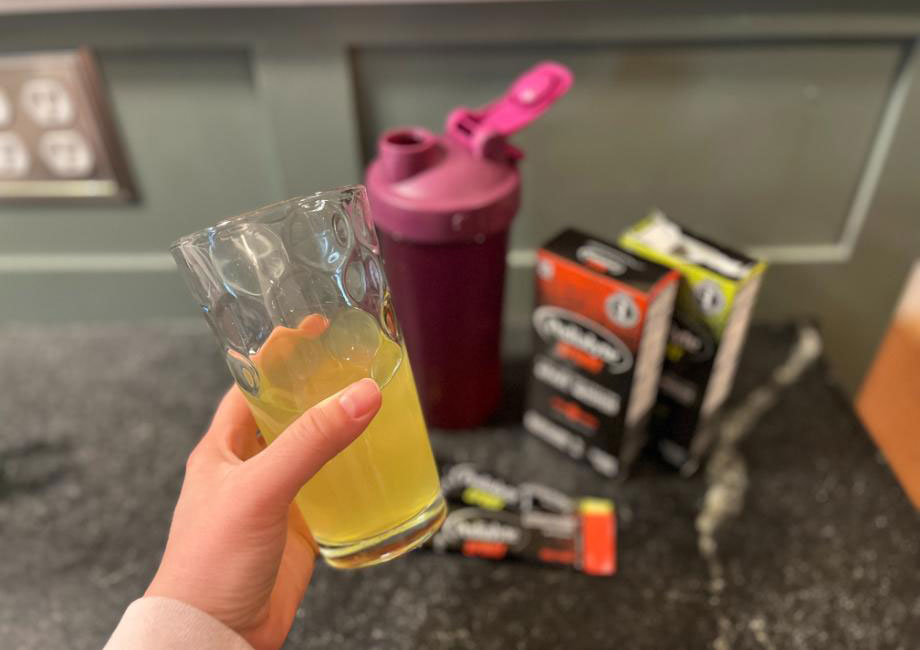
That said, there are plenty of electrolytes to get the job done if hydration is the goal, and while we liked the flavor, the price is pretty high at nearly $2 per serving. So, its overall value depends on your budget and personal preferences.
Great for:
- Athletes who want a break from other sports drinks
- People suffering from diarrhea, common cold, or another illness that makes staying hydrated difficult
- Those who don’t enjoy the flavor of saltier electrolyte drinks
Not recommended for:
- People who prefer sugar free hydration beverages
- Those who avoid sucralose and artificial flavors
- Sedentary individuals who just want a refreshing fruity drink
Pedialyte Sport Specs
| Price per serving | $1.61 – $1.90 |
| Serving size | 12 fl oz |
| Flavors | Fruit Punch, Lemon Lime, Berry Freeze |
| Sodium dosage | 650 mg |
| Potassium dosage | 600 mg |
| Magnesium dosage | 55 mg |
| Chloride dosage | 920 mg |
| Other notable ingredients | Water, dextrose, citric acid |
| Third-party tested? | No |
Experience Using Pedialyte Sport
For this review, we had GGR senior staff writer Lauren Strong, CPT, test it out and let us know what she thought. Lauren had tried Pedialyte for kids previously, so she was eager to try their sport’s version. After testing, she’s pretty convinced it’s just as effective at helping improve hydration status as the pediatric version.
Price Per Serving
Lauren gave Pedialyte Sport a 1 out of 5 for the price. Though the price varies slightly depending on flavor, it still comes to about $1.61 to $1.90 per serving. That’s a bit expensive, considering 12 ounces of Gatorade, a similar sports drink, averages around $0.60 per serving.
Formulation
Lauren gave 2 out of 5 for the formulation of Pedialyte Sport because while sodium, potassium, magnesium, and chloride are present, it also has added sugars and a few artificial ingredients. Here’s a breakdown of the formula per 14.1-gram serving:
- Sodium: 650 mg
- Acesulfame Potassium: 470 mg
- Magnesium: 55 mg
- Chloride: 920 mg
- Total Sugars: 14 g
Now, let’s talk about total carbohydrates and electrolytes. Electrolytes assist in maintaining fluid balance, permitting muscles to contract and relax properly. As a result, muscle cramps or feelings of weakness are often caused by a lack of hydration since the muscles cannot contract optimally.
So, don’t be alarmed by a liter of this stuff containing 60% of your daily value of sodium. Sodium and potassium are key electrolytes that, if not balanced, your muscles can contract but may not be able to relax. This is how muscle cramps happen1. So, when these electrolytes are lost as you sweat during exercise, they need replacing, and that’s where drinks like Pedialyte Sport come in.
RELATED: Best Detergent for Sweaty Clothes

Chloride is the most abundant electrolyte in your blood after sodium, and it keeps the body hydrated by retaining water2, so it’s a good idea to consume it along with fluids and other electrolytes.
Magnesium helps shuttle glucose into your muscles for energy and clears out lactic acid buildup3, which causes muscle soreness and fatigue. One 2013 study even showed athletes who consumed magnesium daily had faster muscle repair and recovery4 after high-intensity training.
That said, science also shows it may not give any benefits if you are not magnesium deficient5, so more research is needed before you get too excited. Phosphorus (or phosphate) is a nutrient that can help with muscular endurance by generating adenosine triphosphate (or ATP), the body’s primary unit of energy.
Like creatine, phosphate can help the body generate ATP faster, thus delaying muscle fatigue6.
RELATED: What Is Creatine?
Now, just one container of Pedialyte Sport contains 28% of your daily value of total sugars, but why? The American College of Sports Medicine recommends that an electrolyte solution or sports drink contain a 5 to 10% total carbohydrate solution7. In short, an optimal sports drink should contain 50 to 100 grams of glucose (or, in this case, dextrose) per liter.
This is the recommendation for several reasons:
- To help replace the muscle glycogen that was lost during exercise
- Sugar helps the cells soak up fluid more quickly for faster rehydration
- Sugar both hides the sometimes salty, metal flavor of the electrolytes and the sweet flavor helps prompt the athlete to drink more quickly
RELATED: Salt Pre-Workout
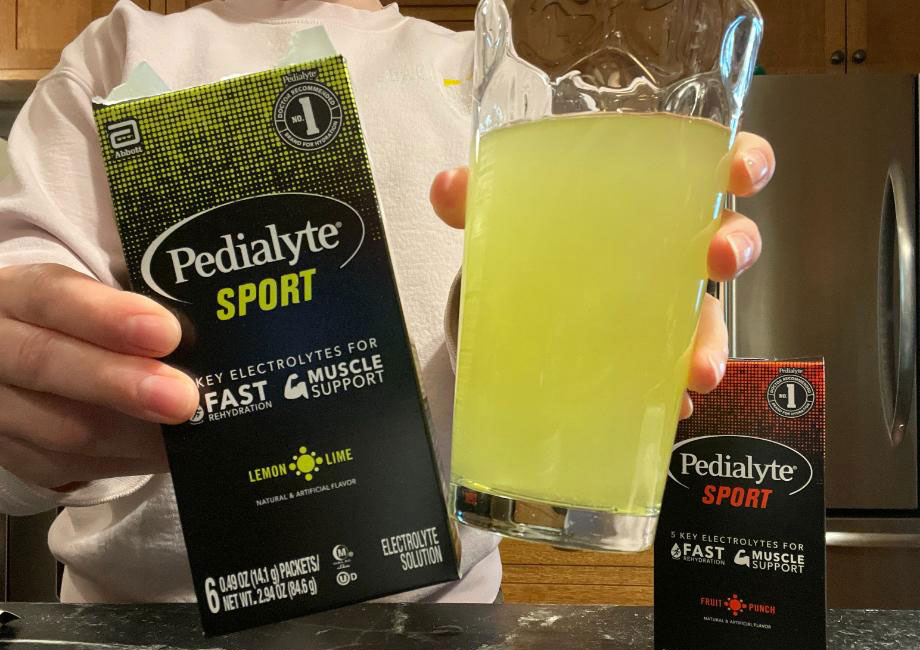
Now, there were ingredients we weren’t fans of, explaining the lower score, like the inclusion of the artificial sweetener sucralose despite there already being dextrose, an added sugar. Also, for unknown reasons, Pedialyte Sport contains milk and Red 40, so vegans and those allergic to milk, artificial flavors, and colors: beware.
Taste and Solubility
Lauren gave Pedialyte Sport 5 out of 5 for solubility as it mixed as an electrolyte powder pretty well. We also gave a 5 out of 5 for taste as Lauren tried the lemon-lime and thought it tasted great. She mixed the electrolyte powder in 20 ounces of water, though, as she felt using less than that gave too intense of a flavor, and using more water made it taste diluted.
Side Effects
We gave a 5 out of 5 for side effects, as our tester reported no issues.
Third-Party Testing
We gave a rating of 2 out of 5 as Pedialyte Sport is not third-party tested, but the label is more or less transparent—aside from us not knowing where the milk is coming from.
Pedialyte Sport Vs Transparent Labs Hydrate
Transparent Labs Hydrate
Transparent Labs Hydrate V3
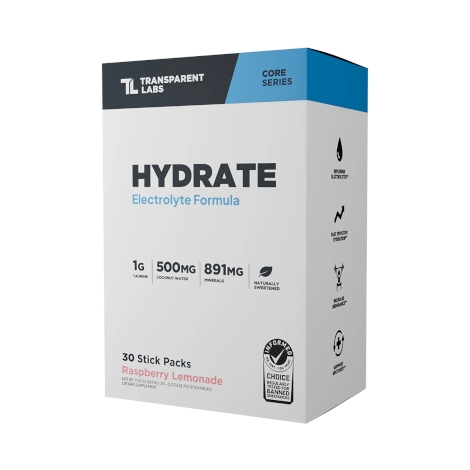
Product Highlights
- Includes taurine to help performance
- Naturally sweetened
- No artificial colors or flavors
- Contains SenactivTM for recovery
Pros & Cons
Pros
- Low cost per serving
- Easily absorbed electrolytes
- Aides in muscle recovery
- Subscribe & Save available
Cons
- Contains the allergen tree nuts
Bottom Line
At an extremely low per serving cost, Transparent Labs Hydrate V3 is a great option for anyone looking to try out electrolytes or anyone looking for clean ingredients without the hefty price tag.
Transparent Labs Hydrate V3 topped our list of the best electrolyte powders, so we wanted to weigh it against Pedialyte Sport. Right away, you can see Transparent Labs Hydrate is significantly cheaper, but it’s also not a ready-to-drink solution, so the cost of convenience may be higher. Transparent Labs also has less potassium per serving and is third-party tested.
Though at first glance, it looks like it doesn’t have chloride. The sodium in Hydrate V3 comes from salt, so there’s chloride present, but it’s a bummer that you can’t quantify how much. Unlike Pedialyte Sport, Hydrate uses stevia as a natural sweetener, which means it’s sugar-free and doesn’t have the glucose or dextrose that gives sports drinks that little extra oomph.
| Pedialyte Sport | Transparent Labs Hydrate V3 | |
| Price per serving | $1.61 – $1.90 | $0.75 |
| Serving size | 12 fl oz | 1 scoop (8.3 g) |
| Flavors | Fruit Punch, Lemon Lime, Berry Freeze | Raspberry Lemonade, Peach Mango, Blue Raspberry, Arctic Freeze, Tropical Punch, Lemon Lime |
| Sodium dosage | 650 mg | 500 mg |
| Potassium dosage | 470 mg | 250 mg |
| Magnesium dosage | 55 mg | 50 mg |
| Chloride dosage | 920 mg | N/A |
| Other notable ingredients | Water, dextrose, citric acid | Calcium, citric acid, malic acid, stevia |
| Third-party tested? | No | Yes, Informed Choice |
Customer Experience
The manufacturer of Pedialyte Sport is Abbott Nutrition, a company that primarily creates products for clinical use for infants and the critically ill. As a result, many of their products are only accessible through memberships, which typically come from medical facilities.
You can get Pedialyte on Amazon and in most stores. If you buy from Amazon, be aware that food and beverages are not eligible for return, and you’ll likely end up buying in bulk as it can be difficult to find single bottles.
Ordering Pedialyte Sport
If you purchase a Pedialyte product from Amazon, you’ll follow the same process as any other Amazon order. So, the cost and flow of checkout will depend on your membership.
Customer Reviews
There are a ton of 5-star reviews for Pedialyte Sport on Amazon (77% are 5-star reviews, to be exact), giving it an average rating of 4.5 out of 5 stars based on 2,625 reviews.
Most reviewers praise the taste and how quickly the electrolyte drink provides rehydration. However, negative reviews are people who hate the taste or have problems with the container.
Final Verdict of Our Pedialyte Sport Drink Review
Pedialyte Sport contains plenty of key electrolytes to aid muscle support and hydration. It also has a great taste to mask the salty, metallic flavor of electrolytes and encourage faster fluid intake. However, the ready-to-drink beverage and powdered version are a bit pricey compared to other brands, so choose your rehydration occasions wisely if this is your electrolyte solution of choice.
Full Rating
Pedialyte Sport
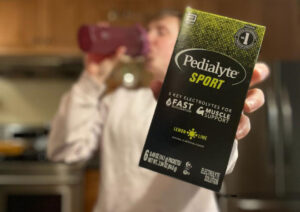
Pedialyte Sport Powder Mix is a travel-friendly upgrade to a classic electrolyte solution.
Product Brand: Pedialyte
Product Currency: $
Product Price: 20.36
Product In-Stock: InStock
3.7
Pedialyte Sport: FAQs
Is Pedialyte sports drink good for you?
It can be if you’re an athlete who needs rapid rehydration or essential electrolytes for medical reasons. However, the drink is not appropriate as a casual beverage.
Is Pedialyte better than Gatorade?
Although Pedialyte Sport markets itself toward athletes, it does contain less sugar than Gatorade. So Gatorade may be the better choice for an athlete. For the general population, it’s more personal preference.
Is it OK to drink Pedialyte everyday?
If you’re engaging in over an hour of intense exercise daily, it’s fine to drink Pedialyte every day. If not, I wouldn’t recommend replacing good ol’ water with a daily electrolyte-replenishing drink.
Does Pedialyte actually work?
Per reviews and a science-backed formulation, it’s safe to assume that Pedialyte is effective as an electrolyte drink.
These statements have not been evaluated by the Food and Drug Administration. This product is not intended to diagnose, treat, cure, or prevent any diseases.
References
- Sweeney HL, Hammers DW. Muscle Contraction. Cold Spring Harb Perspect Biol. 2018;10(2):a023200. Published 2018 Feb 1. doi:10.1101/cshperspect.a023200
- Berend K, van Hulsteijn LH, Gans RO. Chloride: the queen of electrolytes?. Eur J Intern Med. 2012;23(3):203-211. doi:10.1016/j.ejim.2011.11.013
- Zhang Y, Xun P, Wang R, Mao L, He K. Can Magnesium Enhance Exercise Performance?. Nutrients. 2017;9(9):946. Published 2017 Aug 28. doi:10.3390/nu9090946
- Setaro L, Santos-Silva PR, Nakano EY, et al. Magnesium status and the physical performance of volleyball players: effects of magnesium supplementation. J Sports Sci. 2014;32(5):438-445. doi:10.1080/02640414.2013.828847
- Wang R, Chen C, Liu W, et al. The effect of magnesium supplementation on muscle fitness: a meta-analysis and systematic review. Magnes Res. 2017;30(4):120-132. doi:10.1684/mrh.2018.0430
- Allen DG, Trajanovska S. The multiple roles of phosphate in muscle fatigue. Front Physiol. 2012;3:463. Published 2012 Dec 11. doi:10.3389/fphys.2012.00463
- American College of Sports Medicine, Sawka MN, Burke LM, et al. American College of Sports Medicine position stand. Exercise and fluid replacement. Med Sci Sports Exerc. 2007;39(2):377-390. doi:10.1249/mss.0b013e31802ca597


